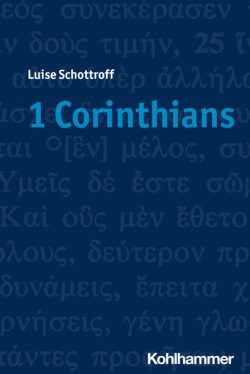Читать книгу 1 Corinthians - Luise Schottroff - Страница 8
На сайте Литреса книга снята с продажи.
2. Christian-Jewish Dialogue
ОглавлениеTo the fundamental question that Luise Schottroff posed in 2013 in the Introduction, »Who was Paul?« there first followed the heading: »Paul the Jew.« In her publications it becomes clear that Jewish-Christian dialogue decisively determines her thinking. In the commentary on the letter to the Corinthian congregation she consistently reads Paul as a Jewish author who has remained true to his theological traditions as he came to faith in Jesus as the Messiah of Israel. Thereby she positions herself within an international debate that, under the watchword »Paul within Judaism,« bundles Jewish and Christian investigations on Paul.3 A central concern of her entire exegetical work is the overcoming of Christian anti-Judaism. Within the framework of a theology after Auschwitz, she sees it as an important task to recognize anti-Jewish stereotypes and ways of thinking and to develop alternatives—in recognition that in the German context there has not been until now a completely non anti-Jewish Christian theology.
Since the middle of the 1960s, there arose in New Testament scholarship the beginnings of an interpretation of Paul’s writings in the context of ancient Judaism, which is now discussed under the title »New Perspective on Paul,« or »Post New Perspective on Paul,« or »Paul Within Judaism.« For the debate in the German-speaking realm, the book by Krister Stendahl, Paul Among Jews and Gentiles (1976), was fundamental; it appeared in translation in 1978 under the title Der Jude Paulus und wir Heiden. This understanding of the Jewish Paul was taken up by Luise Schottroff very early, and she consistently developed it further in her own work.
At the end of the 1980’s, in the context of German-speaking feminist theology, the question of anti-Judaism in Christian theology was carried on publicly in a broad sphere, challenged, above all, by Jewish women theologians. They criticized the fact that even feminist theologians unreflectively perpetuate anti-Jewish stereotypes of Christian theologies, as, for example, the depiction of Jesus as the »new man,« who freed women from a patriarchal, women-oppressing Judaism. The volume, Von der Wurzel getragen. Christlich-feministische Exegese in Auseinandersetzung mit Antijudaismus, which was published in 1996 by Luise Schottroff and Marie-Theres Wacker, fashioned the subsequent exegetical discussions and their results. The essay published by Schottroff in this volume presented alternatives to the (often anti-Judaisticly connoted) construct »law-free Gentile Christianity.«4 She programmatically summarized this in 2013 in the introduction to The First Letter to the Congregation in Corinth:
Paul did not through his call become a Christian but a divine messenger, who spreads the liberating message of Jesus’ resurrection. Paul proclaimed liberation from acting unjustly under the power of sin, not liberation from the Torah and the fulfilling of its instructions. So the issue is liberation to the Torah, not from the Torah.
Luise Schottroff reads not only the letters of Paul but also the gospels in the theological context of Judaism. In her book about the parables of Jesus, which appeared in 2005 and is now in the third edition of 2010 [It appeared in English as The Parables of Jesus. Minneapolis 2006; trans.], the New Testament parables, in comparison with rabbinic parables, are consistently interpreted from their Jewish backgrounds.5 Posthumously published in 2019 were her interpretations of the Gospel of Matthew.6
